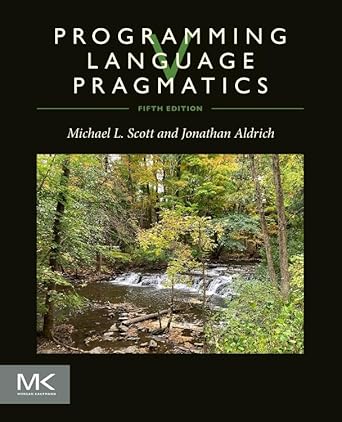Programming Language Pragmatics: A Deep Dive
Introduction
"Programming Language Pragmatics" by Michael Lee Scott is a cornerstone in the field of computer science, offering a comprehensive exploration of the principles and practices behind programming languages. This white paper delves into the core concepts, key areas of focus, and real-world applications of the material presented in the 4th edition.
1. Foundational Concepts
- Syntax and Semantics: The book meticulously examines the building blocks of programming languages:
- Lexical Analysis: How source code is broken down into meaningful units (tokens) by the lexer.
- Parsing: The process of analyzing the grammatical structure of the code, ensuring it adheres to the language's rules.
- Semantics: The meaning and interpretation of the code, encompassing both operational semantics (how the program executes) and denotational semantics (the mathematical meaning of the program).
- Type Systems: A crucial aspect, the book explores various type systems:
- Static Typing: Types are checked at compile time, enhancing safety and allowing for more efficient code generation.
- Dynamic Typing: Types are checked at runtime, offering greater flexibility but potentially introducing runtime errors.
- Type Inference: The compiler automatically infers the types of variables, reducing the burden on the programmer.
- Control Flow: The book delves into how programs control the order of execution:
- Conditional Statements: If-else, switch statements, and their variations.
- Loops: While, for, and other iterative constructs.
- Subroutines: Functions, procedures, and their role in modularizing code.
- Data Structures: The book explores how different languages represent and manipulate data:
- Primitive Data Types: Integers, floating-point numbers, characters, booleans.
- Compound Data Types: Arrays, records, lists, trees, and other complex data structures.
- Object-Oriented Programming: Key concepts like classes, objects, inheritance, polymorphism, and encapsulation are thoroughly explored.
2. Language Implementation
- Compilers: The book delves into the intricate process of compiling source code into machine code, including:
- Intermediate Representations: How high-level code is transformed into lower-level representations (e.g., IR).
- Code Optimization: Techniques like constant folding, loop optimization, and instruction scheduling to improve code performance.
- Runtime Systems: The components that support program execution, such as memory management (garbage collection, memory allocation), exception handling, and concurrency primitives.
- Interpreters: The book explores how interpreters execute code directly, offering flexibility and dynamic behavior.
- Virtual Machines: The concept of abstracting the underlying hardware using virtual machines (e.g., Java Virtual Machine) and their role in language execution.
3. Modern Language Features
- Functional Programming: The book explores functional programming paradigms, including higher-order functions, lambda expressions, and functional composition.
- Concurrency and Parallelism: How languages support concurrent execution models, such as threads, processes, and message passing.
- Metaprogramming: Techniques that allow programs to manipulate themselves at compile time or runtime.
- Scripting Languages: The characteristics and applications of scripting languages like Python, JavaScript, and Ruby.
4. Use Cases and Applications
- Software Development: The principles and concepts covered in "Programming Language Pragmatics" are fundamental for software developers in various domains, including:
- Systems Programming: Developing operating systems, device drivers, and other low-level systems software.
- Application Development: Creating a wide range of applications, from web applications to mobile apps and scientific simulations.
- Compiler Design and Development: Designing and implementing new programming languages and compilers.
- Research and Academia: The book serves as a valuable resource for researchers and academics in the fields of computer science, programming languages, and software engineering.
5. References
- "Programming Language Pragmatics" by Michael Lee Scott (4th Edition)
- ACM Digital Library: https://ieeexplore.ieee.org/
- "Compilers: Principles, Techniques, and Tools" by Alfred V. Aho, Monica S. Lam, Ravi Sethi, and Jeffrey D. Ullman
Conclusion
"Programming Language Pragmatics" provides a comprehensive and insightful exploration of the core concepts and principles underlying programming languages. By delving into the intricacies of syntax, semantics, implementation, and modern language features, this book equips readers with a deep understanding of how programming languages work and how they shape the software landscape.
Disclaimer: This white paper provides a general overview of the key concepts covered in "Programming Language Pragmatics." The specific content and depth of coverage may vary between editions.
This information is for general guidance and may be subject to change. Always refer to the latest edition of the book and other relevant resources for the most up-to-date information.



